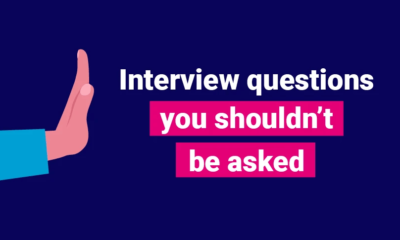Career Tips
How To Answer, ‘What’s Your Expected Salary?’ In A Job Interview

Job interviews are going well. You have the qualifications, the interviewers like you, and those practice sessions with a friend helped you deliver confidently. You could get this job.
Then you hear that awkward question: “What’s your expected salary?”
Many job candidates dread this question about salary requirements. There’s the worry that, if you lowball a figure, you’re leaving money on the table. But if you give a number that’s too high, you might price yourself out of consideration for the role. No matter where you are in your career, that’s a tough calculation.
The good news is that you may negotiate realistic salary expectations during the hiring process. Money discussions with future employers require timing, subtlety, and investigation.
Do this:
1. Research the market and salary trends
The job interview is your chance to persuade the recruiting manager that you are worth top dollar, regardless of the position. You want the employer to think, “That’s who I want to hire,” after the interview. How can I recruit them?”
The first formal interview or phone screening may bring up compensation expectations. You should start planning your “expected salary” answer when you apply for the job. That implies homework.
The U.S. Bureau of Labor Statistics has federal wage data for your industry. Check the Robert Half wage Guide for the average national wage for your desired position. Our Salary Calculator in the guide can be customized for your market.
2. Consider giving a salary range, not a number
Asking about salary in an application or phone interview is inappropriate. Early money talk suggests you’re more interested in the paycheck than the job.
The company may enquire about salary requirements during the initial contact.
When applying for a job, mention a wage range, not an exact number. “Negotiable” may work, but it may make you appear elusive. After researching, you’ll have a suitable salary range.
If a hiring manager asks about salary, you can still give a range and hedge it:
“From what I know about the position, I think somewhere in the area of $XX – $XX.”
Employers like flexible language. Once you learn more about the position and the employer’s expectations for the new hire, you can adjust the statistics.
3. Diplomatically turn the question around
As mentioned, negotiating with a pay range early in the hiring process is not rude. An employer who asks about an expected salary before discussing the job in detail can’t demand a more definite answer.
You can change the question early on. If compensation requirements come up during a phone vetting or your first video interview with the employer, grin and say:
“I’d like to learn more about the position and the duties, and what the team’s like, before discussing money. But may I ask what salary range you’re considering for this position?”
Delivered respectfully, you’ll show that your priority is learning if the role is right for you, which any employer will respect. Your skillful request to divulge the planned wage range will be hard to refuse.
If the employer’s salary range is in your range or greater, thank them for sharing and confirm. If it’s less than you wanted, indicate you’d like to discuss the job.
What for? In a tough job market, some organizations will pay more for excellent people.
Show the employer you have what they want, and you may be able to negotiate a wage you like when you negotiate the job offer.
Say so and ask whether the company will change the figures for the proper hire if the starting range is substantially lower than your desired remuneration. If it’s obvious you won’t agree on salary, don’t waste time or the employer’s.
4. Now it’s time to give a number, not a range
You must commit. By the second interview (or third, if the process takes that long), you’ve probably met team members, learned about the job and how success will be measured, and shared your salary range or the employer’s budget for the position. Only the candidate’s compensation expectations and the employer’s ability to meet them remain. Thus, when an employer requests your estimated salary, you must provide a number, not a range.
Consider your research and interviews while answering the pay expectation question. Do the duties and stress match your expectations? Will you manage unmentioned individuals or processes? What employee benefits, incentives, and bonus possibilities will be offered?
All of it should help you determine a fair and employer-acceptable pay. You may have had to give a wage range initially, but that doesn’t mean you’re stuck with it. Briefly state your compensation expectations. Positive framing is even better. Such as:
- “Given the responsibilities of the position and the number of people I’d be managing, I think $XX is a fair figure. It’s an exciting opportunity, and I truly believe I’m the person for the job.”
- “I’m really excited by the challenges you described! $XX seems like the right starting salary. There’s a lot to take on, and I’m confident I’d succeed in the role.”
- “I’m thinking $XX. This is a big job — one I’m very familiar with and well suited for. I led a similar team at my past employer, and we hit all the goals we were charged with. I’d be very excited to take on another challenge like this!”
- “I remember the salary range you gave me earlier, and I respect the fact that you have to work within a budget. But I’d like to suggest $XX as the starting salary. The responsibilities of this role are quite demanding, and as we’ve both said, I have all the necessary skills and training. I believe I can deliver the results you said you’re looking for.”
Keep it positive and friendly. Be confident and polite. And above all …
5. Always be truthful
Never lie about your experience, training, or work effect. Do not do that in your resume, cover letter, interview, or salary requirements. Your references, abilities exam, or performance in the new job will reveal the reality. It will emerge.
Salary is the same. Focus on your abilities and worth to the role, not your previous pay. Be honest about your pay if questioned. Inflating the stats could cost you the job.
What to do after you’ve settled on salary
The employer offered a salary that matches your expectations. What now? If you need time to think, thank the recruiting manager and request a day or two.
Discuss the start date and express your enthusiasm if you accept the position. Ask for a formal, written offer to confirm job description, salary, perks, and benefits. And don’t give notice at your current job until you’ve signed and returned that written offer.


















